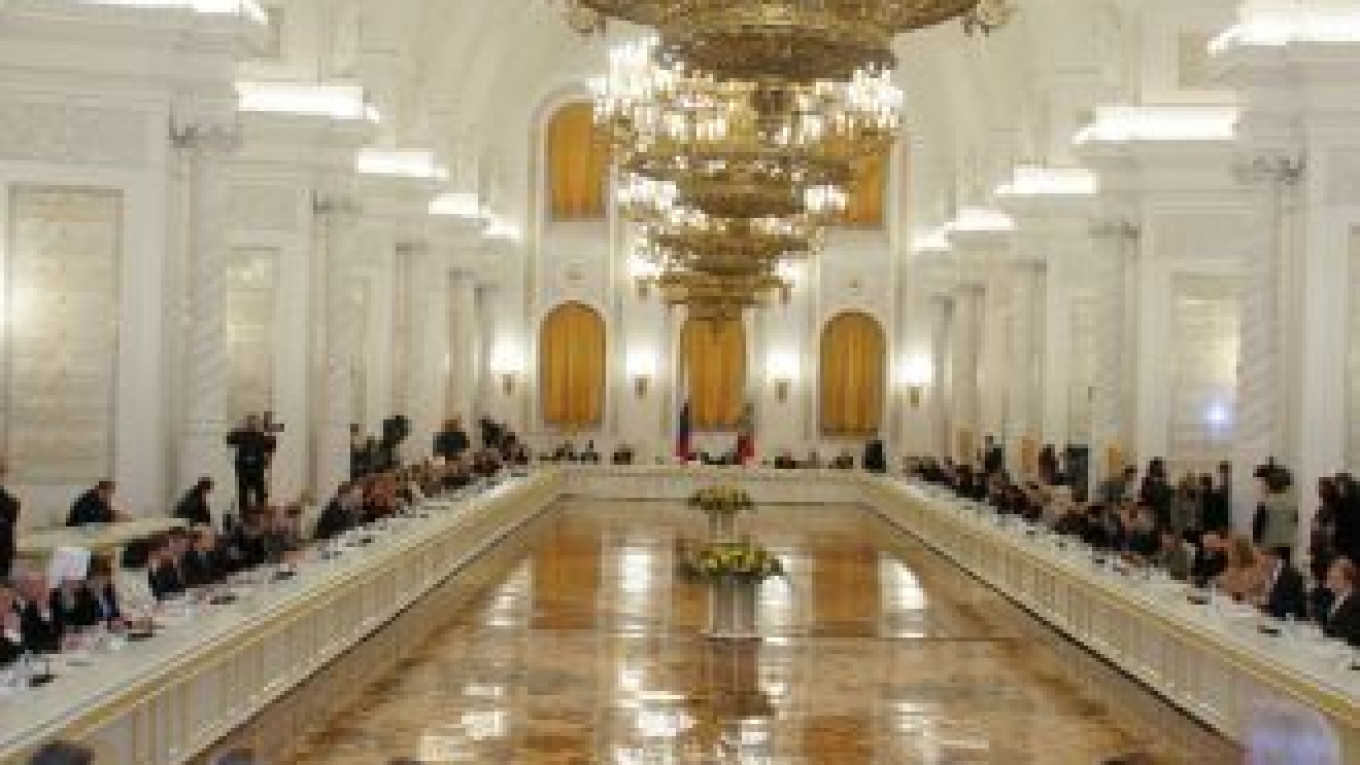Correction appended
The Kremlin has compiled a dossier on the 126 members of the Public Chamber that measures their degree of loyalty and whether they would be willing to act on Kremlin orders, Novaya Gazeta reported.
If confirmed, the internal documents would back suspicions that the Public Chamber, an elected group of citizens that was formed in 2005 with a mandate to influence government policy, is little more than window dressing of a civil society.
"The document shows how the presidential administration rules its own court of civil society," Novaya Gazeta columnist Andrei Kolesnikov said in an introduction to the 42-page dossier, which the newspaper published Friday.
He compared the data on chamber members, who include well-known businessmen, actors and public leaders, to the information given to foreign intelligence agents.
According to the report, the Kremlin believes that billionaire Vladimir Potanin should not be re-elected to the Public Chamber for not taking an active role, while Yaroslav Kuzminov, president of the Higher School of Economics and husband of acting Economic Development Minister Elvira Nabiullina, has not always kept his word to the Kremlin. The dossier purportedly describes Kuzminov as "manageable" but notes that he changed his mind after agreeing to join Putin's re-election team.
Potanin and Kuzminov could not immediately be reached for comment.
Other chamber members are described as "not loyal" and also treated with a certain degree of respect. Mikhail Blinkin, a transportation industry insider who campaigned against a highway through the Khimki Forest, is "dedicated," "respected" and should be "worked with."
It says lawyer Yelena Lukyanova, known for her opposition views, cannot be influenced by the Kremlin and recommends that the Kremlin negotiate with her through another chamber member.
Lukyanova was not available for comment Friday, but political analyst Sergei Markov, who was mentioned in the leaked document as a "loyal" chamber member, said he saw nothing unusual in the existence of such a dossier.
"It is a normal internal document for any political body. If such a document did not exist, people in the presidential administration should be fired," said Markov, vice president of the Plekhanov Russian University of Economics.
He said he believed that the leak was initiated by an opposition-minded relative of a staffer in the presidential administration or was part of an internal fight during the transitional period. "Some people wanted to bang a door," Markov said.
The president selects new members of the Public Chamber every three years, and the next change is scheduled for 2015.
The dossier indicates that the "Letter of 55," a letter signed by 55 chamber members that urged the public not to put pressure on the court system, affected the Kremlin's opinion of the signatories. The letter appeared in March 2011, soon after the second guilty verdict in the trial of former Yukos CEO Mikhail Khodorkovsky, and was seen as an attempt to counterbalance a public campaign in support of him.
Chamber member Iosif Diskin, a political analyst who signed the letter and is mentioned in the leak as a "loyalist," denied by telephone that he had ever acted on Kremlin orders.
"If such a document were created about State Duma deputies, the descriptions would be even more sad to read," he said.
Correction: An earlier version of this article incorrectly stated that members of the Public Chamber are elected; in fact, they are appointed by the president.
A Message from The Moscow Times:
Dear readers,
We are facing unprecedented challenges. Russia's Prosecutor General's Office has designated The Moscow Times as an "undesirable" organization, criminalizing our work and putting our staff at risk of prosecution. This follows our earlier unjust labeling as a "foreign agent."
These actions are direct attempts to silence independent journalism in Russia. The authorities claim our work "discredits the decisions of the Russian leadership." We see things differently: we strive to provide accurate, unbiased reporting on Russia.
We, the journalists of The Moscow Times, refuse to be silenced. But to continue our work, we need your help.
Your support, no matter how small, makes a world of difference. If you can, please support us monthly starting from just $2. It's quick to set up, and every contribution makes a significant impact.
By supporting The Moscow Times, you're defending open, independent journalism in the face of repression. Thank you for standing with us.
Remind me later.


